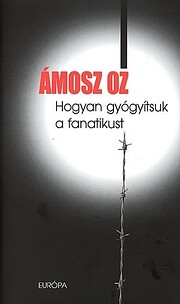

Click on a thumbnail to go to Google Books.
|
Loading... Hogyan gyógyítsuk a fanatikust (2004)Bár az aranyszájú Ámosz Oz nem a kedvenc íróm*, de azon kevés író közé tartozik, akinek irodalmi produktumait is élvezettel forgatom, és politikai megnyilatkozásai is mindig megfontolandónak bizonyulnak. Ebben a pöttynyi kötetben két esszét találunk a fanatizmusról, egy előadást az írásról, és egy grátisz 2005-ös interjút a szerzővel. Mindháromnak kincset ér minden szava, az első két tétel pedig… hát hadd ne mondjam, mennyire aktuális még mindig, már megint, csak épp Bin Ladent vagy a palesztin merénylőket kell behelyettesíteni valami másra. Elképesztően tömör, pontos, intelligens és provokatív szöveg jó adag vonnegut-i szarkazmussal tálalva – én a magam részéről csak azért nem idéztem ki az egészet, mert 1.) lusta vagyok 2.) már idéztek belőle előttem 3.) Oz a szövegben több helyütt is (különösen az utolsó riportban) azért vastagon ismétli önmagát, de ez alighanem egy ilyen műfaj – nem találhat ki magának folyton új igazságokat, csak hogy az olvasónak jó legyen. Ámosz Oz az a fajta gondolkodó, aki annyira szembemegy mindenfajta radikalizmussal, hogy az már önmagában radikalizmus-számba megy. Számára a tolerancia és az elfogadás nem pusztán erkölcsi kérdés, hanem az ideológiákon túlmutató kőkemény szükséglet – mert semmi sem biztosítja jobban úgy általában véve egy társadalom tagjainak túlélését, mint ha kompromisszumkész államban élnek, és országukat kompromisszumkész államok veszik körül. Ha valakinek akad egy-két szabad órája, ajánlom neki ezt a könyvet, igazi gyorstalpaló fundamentalizmus-témakörben. Ha van hibája, az az, hogy (attól tartok) fanatikust pont nem lehet gyógyítani vele. Bár próbálkozni azért lehet. * Bár a Szeretetről, sötétségről sok kedvenc könyvem közül az egyik. Alighanem egyike a legjobb önéletírásoknak, és egyben a korai Izrael állam legpontosabb irodalmi ábrázolása is. This tiny little book, which you can read in under an hour, is a reminder of how much Amos Oz is missed today. The book consists of two short speeches he gave in Germany in 2002, then a few pages about the "Geneva Accords" of 2003, and then a look back a decade later in an interview. Oz was a leading light of the Israeli peace camp, a man who believed strongly in a two-state solution and above all, in the fact that both sides in the dispute between the Israelis and Palestinians could be right, and have rights. Sadly, few today at least among the political elites of Israel and Palestine, seem to share this view. And as for how to cure a fanatic, he has some simple strategies, including reading literature and having a sense of humour. Amos Oz was arguably Israel's greatest writer, but he was also one of its most decent human beings. May his memory be blessed. Short but not sharp, in fact almost gentle, ordinary everyday language in a conversational tone, saying what many Israelis know (I hope) - that the conflict is all about The Land, with which both people have an umbilical link... For me the most welcome part of the writing is where Oz says that the Palestinian leadership - whether Gaza or the West Bank - fail their people by not educating them about the realities of the situation - that the Jews too have a strong link to the country, that their history there goes back many centuries. Oz appeals to a maturity which neither side appears to possess. Those who most need to read this book are unlikely to do so. However, I shall send a copy to an Orthodox Jew of my acquaintance: if no one knocks at the door, it is likely to remain closed for ever. One must cling to hope. It's not really as ambitious as its title, but this collection of two lectures and an interview is still worth a look. Oz tackles the longstanding dispute between Israel and Palestine with a wisdom and clarity that is refreshing. Does he solve the problem? Alas, no. Does he really sketch out a method to cure a fanatic? Again, he does not. I'm certainly no expert on Middle Eastern politics, so I'm in no position to judge the viability or practicality of his suggestions, but what Oz writes feels right. I'll confess, however, that I was unconvinced by his "teaspoon" argument: that if there's a fire, we should do whatever we can to put it out, even if our only water-bearing vessel is a teaspoon. A teaspoon is about all I have, and using it to fight the conflagration of modern fanaticism feel purely futile. An interesting take on the Israeli-Palestinian conflict, in a slim volume (adapted from a couple of lectures). Oz argues that the conflict is between two peoples, both of whom are right about their claim to the land. It's not an opinion that many partisans of both sides will accept, but that might be an argument for it. Still, it could perhaps be expanded beyond these few pages - few even with a totally unenlightening interview with Oz tacked on at the end. |
Current DiscussionsNonePopular covers
 Google Books — Loading... Google Books — Loading...GenresMelvil Decimal System (DDC)956.053History & geography History of Asia Middle East (Near East) Middle EastLC ClassificationRatingAverage: (3.79) (3.79)
|
* Bár a Szeretetről, sötétségről sok kedvenc könyvem közül az egyik. Alighanem egyike a legjobb önéletírásoknak, és egyben a korai Izrael állam legpontosabb irodalmi ábrázolása is. (